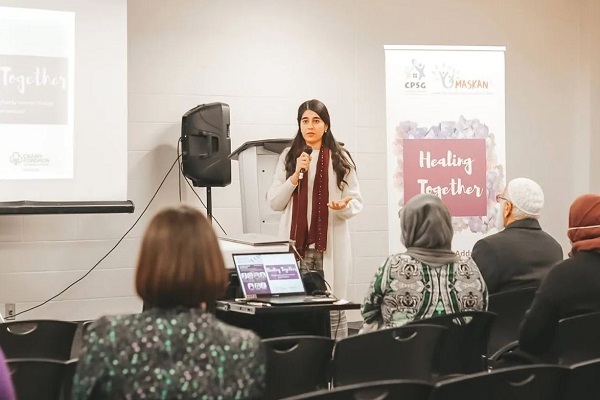Muslim Women in Calgary Share Their Experience of Facing Islamophobia

At 19-years-old, Duaa-Azeem Choudhary is already no stranger to hate.
Born in Quebec to Pakistani immigrant parents who didn't speak French, Choudhary and her family tried to escape the racism they faced in that province by moving to Calgary.
But in her new home, Choudhary became a target of Islamophobic-driven harassment while riding the bus one day. She remembers being the only person on the bus wearing a hijab when a group of men began to stare at her.
"There was a group of white guys that I noticed that kept looking back and I got dirty looks," Choudhary said. She ignored the men hoping that the situation wouldn't escalate, but after they got off the bus, they stopped directly in front of her window.
"One of them spat directly [at] my face. And I don't know, that was like a moment of shock for me because I had never experienced anything like that before and I felt singled out."
That incident happened when Choudhary was 17-years-old — two months after she put on a hijab for the first time. Before that, she says she didn't experience as much racism.
"I could certainly feel a slight change, like colder interactions … but nothing like that had ever happened, so it just took me a while to process it," she said.
Wearing the hijab
Wearing the hijab is considered an act of worship. It's both a personal and independent choice that Muslim women make when they come of age.
Inspired by her mother, Choudhary always wanted to wear the hijab, eventually making the change when she started university.
"A lot of people know that there was an incident in the Prince's Island Park and in that incident a woman who was wearing hijab, it was a hate motivated crime, and she was actually attacked," said Zainab Khan, project manager, Canadian Pakistani Support Group (CPSG) Maskan — a project intended to provide temporary shelter and demand-driven support for a women and children.
In recent times, incidents similar to Choudary's and that at Prince's Island Park have become common. Several women of the Islamic faith have been victims of both verbal and physical assaults in Calgary because of their appearance.
After the Prince's Island Park incident, Khan said that some people within the community were questioning themselves and wondering if they should allow their daughters to wear hijab.
"Should they lose their identity … those were the confusions, those were the things that were going on in the community unheard," she said.
"Those were the things that should be given voice, those experiences."
All of this has made Choudhary begin to wonder if the harassment she and others face are due to misconceptions of Islam.
A more tolerant future
At an event organized by CPSG centred around sharing concerns and recommendations about combating hate crimes and racism, Muslims and non-Muslims came together to recount their experiences and come up with ways to attempt to eradicate hate.
"If these hate crimes are happening because of false perceptions of our religion, then maybe we need to talk about what our religion is," Choudhary said.
The event is an instalment of the provincial government's anti-racism series — a plan set out by the Government of Alberta to bring about more tolerance and understanding.
More specifically, the event focused on voicing the concerns and experiences of Muslims and Muslim women — especially those who wear hijabs — in an attempt to gather information for the government to combat discrimination.
For both Choudhary and Khan, the way forward is simple. Educate people about Islam and highlight the religion's messages of peace, tolerance, and equality.
"It takes all of us to build an inclusive and diverse Alberta. And for us it's important that we learn about different cultures and religions," said Khan.
"It's all about connecting with each other and spreading the message of peace."
Site: cbc.ca



